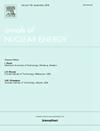Research on reactor core pin-by-pin calculation based on new leakage corrected SPH method
IF 1.9
3区 工程技术
Q1 NUCLEAR SCIENCE & TECHNOLOGY
引用次数: 0
Abstract
The pin-by-pin calculation method based on pin cell homogenization has become one of the most interesting neutronics calculation methods since it can directly give the detailed pin cell power distribution rather than through power reconstruction. The strong heterogeneity of pin-by-pin calculation model needs an advanced homogenization method to consider the neutron spectrum interference. The super homogenization (SPH) method is one of the mostly used homogenization methods in pin-by-pin calculations due to the advantages of its good applicability and low memory usage. In the traditional SPH method, SPH factors are used for the correction of few-group constants, and they are calculated by imposing the reaction rate preservation. However, neutron leakage conservation is not preserved, which will cause a large error on few-group cross-sections especially for strong heterogeneous configuration since the surrounding fuel assembly can largely affect the neutron spectrum of the target homogenization model. In this study, an improved leakage corrected SPH (LC-SPH) method is proposed. The idea of LC-SPH is that the discrepancy in neutron leakage difference between homogeneous and heterogeneous problems can be represented as an absorption reaction rate, thereby preserving the total neutron disappearance rate during homogenization. Five pin-by-pin calculation problems with different complexity were employed to verify the LC-SPH method both for neutron transport and neutron diffusion theory. The results show that the improved SPH method always converges within 20 iterations, which is much faster than the traditional SPH method. In conditions of strong neutron leakage, the traditional SPH method sometimes cannot converge, while the convergence of LC-SPH method is excellent and can reduce the keff error to under 100 pcm in P3 core calculations.
求助全文
约1分钟内获得全文
求助全文
来源期刊

Annals of Nuclear Energy
工程技术-核科学技术
CiteScore
4.30
自引率
21.10%
发文量
632
审稿时长
7.3 months
期刊介绍:
Annals of Nuclear Energy provides an international medium for the communication of original research, ideas and developments in all areas of the field of nuclear energy science and technology. Its scope embraces nuclear fuel reserves, fuel cycles and cost, materials, processing, system and component technology (fission only), design and optimization, direct conversion of nuclear energy sources, environmental control, reactor physics, heat transfer and fluid dynamics, structural analysis, fuel management, future developments, nuclear fuel and safety, nuclear aerosol, neutron physics, computer technology (both software and hardware), risk assessment, radioactive waste disposal and reactor thermal hydraulics. Papers submitted to Annals need to demonstrate a clear link to nuclear power generation/nuclear engineering. Papers which deal with pure nuclear physics, pure health physics, imaging, or attenuation and shielding properties of concretes and various geological materials are not within the scope of the journal. Also, papers that deal with policy or economics are not within the scope of the journal.
 求助内容:
求助内容: 应助结果提醒方式:
应助结果提醒方式:


